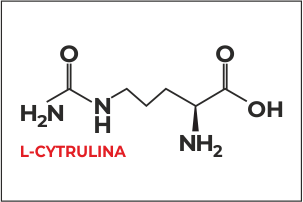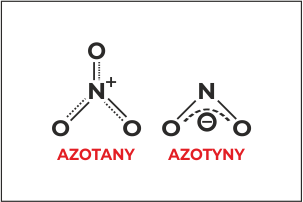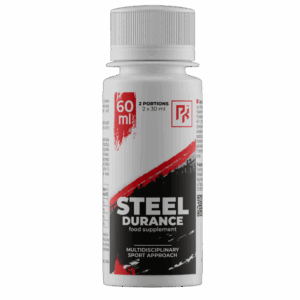I_CAN monthly supplement package
1 buyer just looking at this product.170,00 PLN
The set includes:
20x Steel Durance
Product advantages
- Complete utilization of all metabolic pathways leading to nitric oxide synthesis.
- Increase aerobic capacity.
- Naturally increase energy metabolism without the effect of excessive irritation and agitation.
- Without the "down" effect (feeling even more tired and fatigued after time).
- Improved cognitive function, reaction speed, concentration and focus.
- Guaranteed stimulation without added caffeine - can be consumed even before evening workout sessions.
Dedicated to people:
- Physically active, to increase performance during training/work,
- working mentally or learning, to maximize performance with ingredients that stimulate cognitive function,
- performing activities for long periods of time to reduce fatigue and tiredness, such as drivers during long car rides.
LABEL INFORMATION
STEEL DURANCE A dietary supplement in liquid form. Contains sweeteners.
A formula combining the amino acids arginine and citrulline, enriched with sage leaf extract and red spinach.
The product is intended for physically active adults, especially those who practice endurance sports.
Ingredients: Water, kombucha (fermented tea - water, black tea, sugar, kombucha cultures), L-arginine, red spinach leaf extract (Amaranthus tricolor L.), L-citrulline, acidity regulator citric acid; apple juice from 20% concentrated apple juice, sage leaf extract (Salvia officinalis L.), sweeteners - acesulfame K, sucralose; flavors, preservative - sorbic acid.
| Nutritional information | Daily serving = 30 ml (½ shot) |
|---|---|
| Red spinach extract | 2000 mg |
| L-arginine | 2000 mg |
| L-Citrulline | 1500 mg |
| Sage extract | 400 mg |
Recommended daily serving: consume 30 ml (2 x 15 ml) once a day, about 30-60 minutes before final exercise. Shake several times before use. After opening, store in the refrigerator and consume within 48h. Sediment and crystallization that may appear are natural phenomena and do not affect the quality of the product. Do not exceed the portion recommended for consumption during the day. The dietary supplement should not be used as a substitute for a varied diet. A balanced diet and healthy lifestyle are recommended. Keep out of reach of small children.
Note: Product not recommended for hypotension. Do not use together with medications especially for hypertension. Not recommended in pregnancy, breastfeeding or with hypersensitivity to any of the ingredients of the product.
Storage: At room temperature, away from direct heat sources.
PRODUCT DESCRIPTION
There is a growing interest in the sports supplement market in ingredients that help raise nitric oxide levels in the body to improve blood flow and thus help athletes perform long and hard workouts.
Many products aimed at the action of increasing training capacity have already been developed, but for various reasons have not met the expectations of athletes, as some:
- substances can cause intestinal and gastrointestinal disorders,
- of substances/products have to be taken in large doses/portions, which can also be uncomfortable before training,
- of substances/products are not very effective, they are short-lived because they use only one of the metabolic pathways.
Nitrates, and in particular juices containing them, such as beet juice, are of increasing interest to endurance athletes.
However, this product category continues to see the same error described above (low product effectiveness and duration due to failure to use the full potential of all metabolic pathways).
However, there are ingredients that, in the right combination with each other, show a much higher accumulation of nitrates and show a much better and longer effect than the nitrate-containing juice alone.
Only an in-depth understanding of the mechanisms and synergies of specific ingredients will allow you to understand how to get to the next level of training execution.
Leave your competitors far behind!
STEEL DURANCE
This product is mainly dedicated to athletes of endurance sports, whose main goal is to maximize endurance and aerobic capacity. However, also those who practice sports with other characteristics can strongly improve their performance.
More below.
The ingredients of the product are a proprietary composition based on knowledge, experience and news in the field of science.
STEEL DURANCE is the only product composed to use all metabolic pathways for nitric oxide synthesis.
- Without excessive stimulation of the nervous system, which can cause distraction.
- With no stimulation of catecholamines (epinephrine, norepinephrine, dopamine), the product can be consumed during evening training sessions without disrupting sleep patterns.
- Without the risk of the "descent effect," which is often seen, for example, after taking a product that is supposed to stimulate, but generates even more fatigue and tiredness (32).
- It works for up to 8 hours (26).
Below you can find a detailed description of the ingredients with scientific evidence of why STEEL DURANCE is the best pre-workout formula for endurance sports (and beyond).
The main goal of STEEL DURANCE is to produce and utilize as much nitric oxide as possible.
Let's start with what nitric oxide is and why it is so insanely important in endurance sports, but not only!
NITROGEN OXIDE
It is an inorganic chemical compound whose most well-known and remarkable function, in the context of sports physiology, is its role in controlling vasodilation of blood vessels. This leads to improved transport of blood, oxygen and a role in mitochondrial respiration, thereby enhancing training efficiency and performance (1).
There are three routes to nitric oxide synthesis:
- By the enzyme NO synthase (arginine).
- By providing a substrate for the production of arginine (citrulline).
- By reducing nitrates in the mouth and stomach to nitric oxide (nitrate-containing plants).

ARGININA

Arginine is an amino acid that participates in the synthesis and bioavailability of nitric oxide (NO). As a result, it exhibits a vasodilatory effect, facilitating the flow of blood and thus oxygen and nutrients to working muscles (2,3).
Arginine supplementation reduces levels of ammonia, lactate, fatty acids after exercise (4,5).
It shows an increase in post-exercise glycerol levels, with improved carbohydrate oxidation and aerobic capacity, with potential benefits in endurance sports (6).
Thus, arginine has been shown to affect various physiological and metabolic pathways that can improve athletic performance in both aerobic and anaerobic endurance (7).
For example:
A study of 56 soccer players showed that supplementation with 2 g of L-arginine daily for 45 days, significantly improved athletic performance compared to the placebo group (8).
Another study found that people taking a drink containing 6 grams of L-arginine 1 hour before intense cycling exercise had significantly increased blood nitric oxide levels and were able to exercise longer, compared to the placebo group (9).
Supplements with arginine are also often popularly used by a group of people engaged in resistance training (weightlifting, power triathlon,bodybuilding).
The vasodilator and blood flow-enhancing effect not only has a beneficial effect by providing oxygen and improving faster metabolite utilization, but also accumulates large amounts of oxygenated blood in working muscles, resulting in a visual "muscle pump" effect, making muscles during training feel bigger, bulkier and pumped up which is associated with greater motivation and training satisfaction and potential benefits leading to muscle hypertrophy (growth), also with possible positive effects on muscle strength.
Arginine is converted to nitric oxide via the enzyme NO synthase (NOS).
This reaction is a two-step process in which arginine reacts with oxygen to form nitric oxide and citrulline (10).
The process works effectively when sufficiently large amounts of arginine are present in the body.
However, arginine is also involved in another metabolic pathway, in which it binds to the enzyme arginase, where it reacts with water and is converted to ornithine and urea (7).
Both reactions have similar substrate utilization rates. This means that half of the exogenous (supplemented) arginine, will be utilized by the NOS enzyme to produce nitric oxide, and the other half will be utilized by arginase (11).
So, in order to maximize the formation and utilization of nitric oxide, it doesn't necessarily make sense to outdo just the amount of arginine per serving (a behavior often seen among sports supplement manufacturers).
Indeed, at high single doses, arginine can cause unpleasant side effects, including bloating, abdominal pain, nausea and diarrhea (12).
Therefore, in order to increase nitric oxide production, other metabolic pathways leading to nitric oxide formation can be used.
CITRULINE
As a substrate in the production of nitric oxide

L-citrulline can increase nitric oxide levels, although citrulline itself does not directly affect NO formation.
L-arginine is the main precursor of nitric oxide, through the activity of the enzyme nitric oxide synthase (NOS).
L-citrulline is the second NO donor in the NOS-dependent pathway, as it can be converted to L-arginine (13).
Thus, citrulline can act as a precursor for the synthesis of arginine, which is a substrate for nitric oxide synthases (NOS).
The importance of L-citrulline as an ergogenic support stems from the fact that L-citrulline is absorbed in the gut to a much greater extent than L-arginine, and thus could itself be an effective way to raise extracellular levels of L-arginine.
This hypothesis is supported by a study that showed that oral citrulline supplementation increased plasma arginine levels more than arginine alone.
The study found that subjects who consumed 3 g of citrulline had higher plasma arginine levels and increased urinary nitric oxide and cGMP metabolites, compared to those taking arginine solo (15).
L-citrulline malate may also benefit ammonia elimination during recovery from strenuous muscle exercise, and as an effective precursor to L-arginine and creatine.
The ergogenic response of L-citrulline or L-arginine supplements depends on the subjects' level of training.
Studies involving untrained individuals have shown that NO donors can improve the performance of aerobic and anaerobic exercise.
There is another alternative metabolic pathway, independent of NOS, the NO synthesis pathway, based on the simple reduction of nitrate and nitrite, that can increase nitric oxide levels in the body (16,17).
The combination of arginine, citrulline and nitrates may therefore be the best(!) and most innovative(!) combination leading to efficient production and utilization of nitric oxide by athletes!
AZOTANS
Another metabolic pathway through which NO can be produced is the nitrate-nitrite-nitric oxide pathway.

Nitrates (NO3-) taken in with food can be converted to nitrites (NO2-). Once converted to nitrites, these molecules can be reduced to nitric oxide using nitrite reductase without worrying about side reactions that can reduce nitric oxide production (as with arginine due to arginase) (18).
Nitrates are present in many foods and are found in large quantities in green leafy vegetables and beets.
Studies show that dietary nitrates increase nitric oxide (NO) production in the muscles, which triggers a cascade of reactions that lead to increased training performance (19-21).
First of all, NO relaxes the smooth muscles in the walls of blood vessels so they can open wide to allow more blood to flow through, which lowers blood pressure.
As a result, the heart doesn't have to work as hard, pumping the blood it needs, and this improves exercise performance.
Interestingly, nitrate supplementation also reduces "oxygen cost"/oxygen debt during submaximal exercise and may improve tolerance and training performance.
In one study, recreational cyclists drinking large doses of concentrated beet juice (a natural source of nitrates) consumed about 3 percent less oxygen - meaning less energy consumption during exercise tests than the placebo group (22).
In 2018, the International Olympic Committee officially took a position, recognizing that there is strong evidence of the benefits of nitrate supplementation (23).
In a study by researchers at Aalborg University in Denmark (24), they subjected well-trained cyclists to a series of tests. First, each volunteer drank two doses of concentrated beet juice (enough to produce 12 mmol of nitrates) for a week, and then they performed 10-km time trials. The cyclists' average power output improved by about 5 watts and they finished the 10 km race 1.6 percent faster after seven days of consuming beet juice.
The authors concluded that these results provide evidence of the following.
Chronic supplementation with high doses of nitrates improves the performance and efficiency of well-trained athletes.
Thus, for untrained and recreationally exercising individuals, the addition of nitrates appeared to provide performance benefits.
Separately, athletic athletes who already naturally produce large amounts of nitric oxide - training adaptation - should be considered, so the benefits of drinking beet juice will only be a temporary boost in them.
However, it turns out that highly trained people simply need a higher dose of nitrates to get the right "energy boost," since their bodies already produce high levels of NO on their own.
VOLUME AND DOSAGES
To get such doses of nitrates, one would have to drink about 500 ml of beet juice, which is not convenient or good for the stomach before training.
As for other sources of nitrates, Dr. Andrew Coggan, for his research work, measured nitrate content in beets, where there is considerable variability in the market, as well as in red spinach extracts (25).
Findings show that red spinach extracts are richer in nitrates than beets, and one study showed that a single dose of red spinach extract raised nitrate levels in healthy adult subjects after just 30 to 60 minutes, and NO levels remained elevated for eight hours (26).
A study published in the Journal of Strength and Conditioning Research reports that people supplementing with nitrate-rich red spinach extract significantly improved their athletic performance.
There was a reduction in test time (a 4-kilometer bicycle test) due to the increase in power and speed.
The red spinach supplement group also saw a reduction in diastolic blood pressure during as well as after exercise (27).
In another study, researchers examined 17. active men and women who took 1 gram of red spinach extract or a placebo for seven days, followed by another dose one hour before performing an endurance test.
Red spinach supplementation showed a significant increase in performance. The red spinach supplementation group completed the timed test an average of 6 seconds faster (6:44 vs. 6:50) than the placebo group. In addition, their average power output was 4.3 watts higher (185.9 watts vs. 181.6 watts) (28).
SLAVIA
Studies on athletes indicate that sage improves cognitive function (working memory, reaction time and less feeling of fatigue and exertion).
The positive effects were obtained in the pre-exercise state and persisted even with fatigue (29).

The action of improving memory and concentration occurs by inhibiting acetylcholinesterase, an enzyme that breaks down the neurotransmitter acetylcholine (30,31). This metabolic pathway improves concentration, alertness, but takes place without stimulation of catecholamines such as epinephrine, norepinephrine or dopamine, so it does not stimulate like caffeine/coffee.
Such action is particularly important in athletes who need to be permanently focused and make quick decisions, e.g. martial arts, all kinds of racing.
The use of sage will therefore be expedient in both sports:
- Short-term and sprinting (speed and reaction time),
As well as in disciplines characterized by:
- long effort (long-distance running, cycling, etc.).
BIBLIOGRAPHY
- Oral O. Nitric oxide and its role in exercise physiology. J Sports Med Phys Fitness. 2021 Sep;61(9):1208-11.
- Kerksick CM, Wilborn CD, Roberts MD, Smith-Ryan A, Kleiner SM, Jäger R, et al. ISSN exercise & sports nutrition review update: research & recommendations. J Int Soc Sports Nutr. 2018 Aug;15(1):38.
- Wu G, Morris SMJ. Arginine metabolism: nitric oxide and beyond. Biochem J. 1998 Nov;336 ( Pt 1(Pt 1):1-17.
- Schaefer A, Piquard F, Geny B, Doutreleau S, Lampert E, Mettauer B, et al. L-arginine reduces exercise-induced increase in plasma lactate and ammonia. Int J Sports Med. 2002 Aug;23(6):403-7.
- Tsai P-H, Tang T-K, Juang C-L, Chen KW-C, Chi C-A, Hsu M-C. Effects of arginine supplementation on post-exercise metabolic responses. Chin J Physiol. 2009 Jun;52(3):136-42.
- Forbes SC, Harber V, Bell GJ. The acute effects of L-arginine on hormonal and metabolic responses during submaximal exercise in trained cyclists. Int J Sport Nutr Exerc Metab. 2013 Aug;23(4):369-77.
- Huerta Ojeda Á, Domínguez de Hanna A, Barahona-Fuentes G. [The effect of supplementation with L-arginine and L-citrulline on physical performance: a systematic review]. Nutr Hosp. 2019 Dec;36(6):1389-402.
- Pahlavani N, Entezari MH, Nasiri M, Miri A, Rezaie M, Bagheri-Bidakhavidi M, et al. The effect of l-arginine supplementation on body composition and performance in male athletes: a double-blinded randomized clinical trial. Eur J Clin Nutr. 2017 Apr;71(4):544-8.
- Bailey SJ, Winyard PG, Vanhatalo A, Blackwell JR, DiMenna FJ, Wilkerson DP, et al. Acute L-arginine supplementation reduces the O2 cost of moderate-intensity exercise and enhances high-intensity exercise tolerance. J Appl Physiol. 2010 Nov;109(5):1394-403.
- Knowles RG, Moncada S. Nitric oxide synthases in mammals. Biochem J. 1994 Mar;298 ( Pt 2(Pt 2):249-58.
- Durante W, Johnson FK, Johnson RA. Arginase: a critical regulator of nitric oxide synthesis and vascular function. Clin Exp Pharmacol Physiol. 2007 Sep;34(9):906-11.
- McRae MP. Therapeutic Benefits of l-Arginine: An Umbrella Review of Meta-analyses. J Chiropr Med. 2016 Sep;15(3):184-9.
- Sureda A, Pons A. Arginine and citrulline supplementation in sports and exercise: ergogenic nutrients? Med Sport Sci. 2012;59:18-28.
- Schmidt HH, Nau H, Wittfoht W, Gerlach J, Prescher KE, Klein MM, et al. Arginine is a physiological precursor of endothelium-derived nitric oxide. Eur J Pharmacol. 1988 Sep;154(2):213-6.
- Schwedhelm E, Maas R, Freese R, Jung D, Lukacs Z, Jambrecina A, et al. Pharmacokinetic and pharmacodynamic properties of oral L-citrulline and L-arginine: impact on nitric oxide metabolism. Br J Clin Pharmacol. 2008 Jan;65(1):51-9.
- Benjamin N, O'Driscoll F, Dougall H, Duncan C, Smith L, Golden M, et al. Stomach NO synthesis. Vol. 368, Nature. England; 1994. p. 502.
- Lundberg JO, Weitzberg E, Lundberg JM, Alving K. Intragastric nitric oxide production in humans: measurements in expelled air. Gut. 1994 Nov;35(11):1543-6.
- Lundberg JO, Weitzberg E, Gladwin MT. The nitrate-nitrite-nitric oxide pathway in physiology and therapeutics. Nat Rev Drug Discov [Internet]. 2008;7(2):156-67. Available from: https://doi.org/10.1038/nrd2466
- Wylie LJ, Bailey SJ, Kelly J, Blackwell JR, Vanhatalo A, Jones AM. Influence of beetroot juice supplementation on intermittent exercise performance. Eur J Appl Physiol [Internet]. 2016;116(2):415-25. Available from: https://doi.org/10.1007/s00421-015-3296-4
- Thompson C, Vanhatalo A, Jell H, Fulford J, Carter J, Nyman L, et al. Dietary nitrate supplementation improves sprint and high-intensity intermittent running performance. Nitric Oxide [Internet]. 2016;61:55-61. Available from: https://www.sciencedirect.com/science/article/pii/S1089860316301185
- Thompson C, Wylie LJ, Fulford J, Kelly J, Black MI, McDonagh STJ, et al. Dietary nitrate improves sprint performance and cognitive function during prolonged intermittent exercise. Eur J Appl Physiol. 2015 Sep;115(9):1825-34.
- Wylie LJ, Kelly J, Bailey SJ, Blackwell JR, Skiba PF, Winyard PG, et al. Beetroot juice and exercise: pharmacodynamic and dose-response relationships. J Appl Physiol. 2013 Aug;115(3):325-36.
- Maughan RJ, Burke LM, Dvorak J, Larson-Meyer DE, Peeling P, Phillips SM, et al. IOC consensus statement: dietary supplements and the high-performance athlete. Br J Sports Med [Internet]. 2018 Apr 1;52(7):439 LP - 455. Available from: http://bjsm.bmj.com/content/52/7/439.abstract
- Rokkedal-Lausch T, Franch J, Poulsen MK, Thomsen LP, Weitzberg E, Kamavuako EN, et al. Chronic high-dose beetroot juice supplementation improves time trial performance of well-trained cyclists in normoxia and hypoxia. Nitric oxide Biol Chem. 2019 Apr;85:44-52.
- Gallardo EJ, Coggan AR. What Is in Your Beet Juice? Nitrate and Nitrite Content of Beet Juice Products Marketed to Athletes. Int J Sport Nutr Exerc Metab [Internet]. 2019;29(4):345-9. Available from: https://journals.humankinetics.com/view/journals/ijsnem/29/4/article-p345.xml
- Subramanian D, Gupta S. Pharmacokinetic study of amaranth extract in healthy humans: A randomized trial. Nutrition. 2016;32(7-8):748-53.
- Gonzalez AM, Accetta MR, Spitz RW, Mangine GT, Ghigiarelli JJ, Sell KM. Red Spinach Extract Supplementation Improves Cycle Time Trial Performance in Recreationally Active Men and Women. J Strength Cond Res [Internet]. 2021;35(9). Available from: https://journals.lww.com/nsca-jscr/Fulltext/2021/09000/Red_Spinach_Extract_Supplementation_Improves_Cycle.27.aspx
- Coggan AR, Broadstreet SR, Mikhalkova D, Bole I, Leibowitz JL, Kadkhodayan A, et al. Dietary nitrate-induced increases in human muscle power: high versus low responders. Physiol Rep. 2018 Jan;6(2).
- Babault N, Noureddine A, Amiez N, Guillemet D, Cometti C. Acute Effects of Salvia Supplementation on Cognitive Function in Athletes During a Fatiguing Cycling Exercise: A Randomized Cross-Over, Placebo-Controlled, and Double-Blind Study. Front Nutr. 2021;8:771518.
- Scholey AB, Tildesley NTJ, Ballard CG, Wesnes KA, Tasker A, Perry EK, et al. An extract of Salvia (sage) with anticholinesterase properties improves memory and attention in healthy older volunteers. Psychopharmacology (Berl). 2008 May;198(1):127-39.
- Kennedy DO, Pace S, Haskell C, Okello EJ, Milne A, Scholey AB. Effects of cholinesterase inhibiting sage (Salvia officinalis) on mood, anxiety and performance on a psychological stressor battery. Neuropsychopharmacology. 2006 Apr;31(4):845-52.
- Ishak WW, Ugochukwu C, Bagot K, Khalili D, Zaky C. Energy drinks: psychological effects and impact on well-being and quality of life-a literature review. Innov Clin Neurosci. 2012 Jan;9(1):25-34.
Only logged in customers who have purchased this product may leave a review.





Reviews
There are no reviews yet